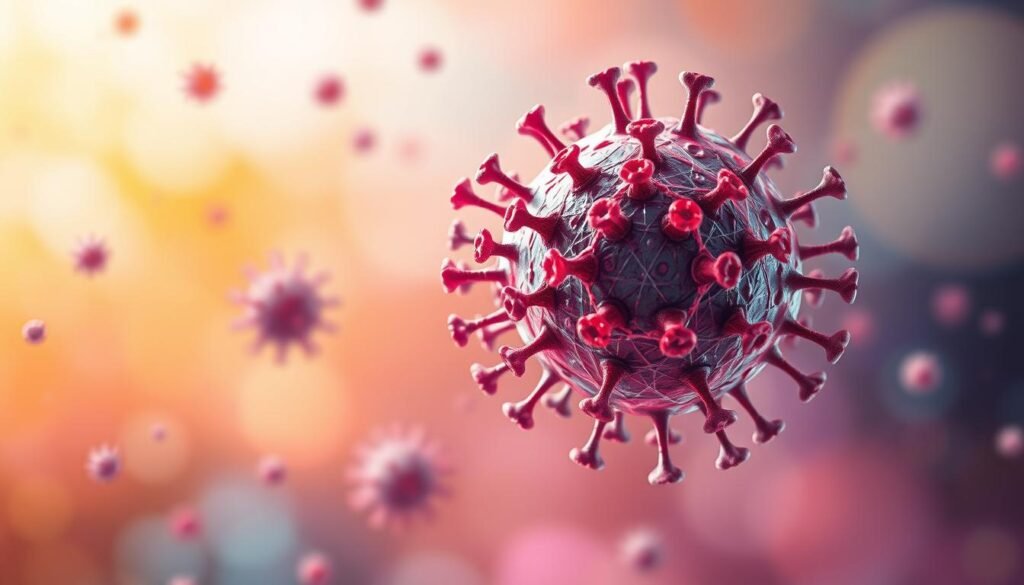Did you know that around 30-50% of people with allergies also feel very tired? This shows how allergies can deeply affect someone’s energy and daily life. Allergies are not just annoying during certain seasons. They can cause serious tiredness that makes everyday tasks hard.
The link between allergies and feeling worn out is complicated. It involves how our bodies react to things in the air or our surroundings. Often, allergies can make it hard to sleep well. This leaves us feeling exhausted. About 28% of those with allergies suffer from bad sleep because of chronic allergic rhinitis. It’s key to understand how allergies can make you tired to treat it well.
Many Americans deal with allergies and often overlook how much it can drain their energy. This article will show how allergies and tiredness are connected. And it will give tips on how to handle these symptoms. With the right approach, you can feel more energetic and enjoy life more.
Key Takeaways
- Fatigue is a common symptom experienced by 30-50% of individuals with allergies.
- Allergic reactions can significantly impact sleep quality and overall wellness.
- Managing allergies effectively can lead to improved energy levels and quality of life.
- Common treatments for allergies may also contribute to feelings of drowsiness.
- Recognizing the interplay between allergy symptoms and fatigue can guide better health choices.
What Are Allergies?
Allergies are when the body reacts too much to things that are usually safe. It sees these so-called allergens as dangers. This causes symptoms with varying degrees of severity. Learning about the types of allergies is important. It helps in knowing what triggers them and in managing symptoms well.
Common allergens include:
- Pollen
- Dust mites
- Pet dander
- Common molds
- Certain foods
In the United States, about 50 million people have allergies. This makes it one of the most common chronic health issues. Specifically, around 32 million Americans deal with food allergies. Then, exercise-induced bronchoconstriction (EIB) affects close to 10 percent of people. This shows how a large number of individuals suffer from allergies all year round. This is mainly due to continuous indoor allergen exposure.
The link between what causes allergies and one’s health is significant. Histamines, which are released during allergic reactions, can mess with sleep. This leads to feeling tired. Around 70% of people with allergies report fatigue or cognition problems like brain fog. Moreover, 90% of folks with asthma also struggle with EIB.
| Allergen Type | Symptoms | Common Sources |
|---|---|---|
| Pollen | Sneezing, itchy eyes, runny nose | Trees, grasses, weeds |
| Dust Mites | Nasally congestion, asthma | Mattresses, bedding, carpets |
| Pet Dander | Itchy skin, respiratory issues | Cats, dogs, rodents |
| Mold | Coughing, wheezing, eye irritation | Bathrooms, water-damaged areas |
| Food Allergies | Hives, swelling, digestive issues | Peanuts, shellfish, dairy |
Knowing about common allergens and symptoms is key for people living with allergies. It allows them to avoid triggers. And it helps keep their allergic reactions to a minimum.
Understanding Allergic Reactions
Allergic reactions happen when the immune system wrongly sees harmless things as dangers. This mistake causes an immune response to allergens. The body makes antibodies named immunoglobulin E (IgE). These antibodies go to cells, causing them to release histamine and other chemicals.
This release of histamine raises histamine levels. It leads to common allergy symptoms like sneezing, itching, and swelling. Each of these symptoms can be a sign of an allergic reaction.
Allergic reactions can vary a lot from person to person. Some might only have mild symptoms. But others could face life-threatening situations like anaphylaxis. It’s vital to know how severe reactions can be and when to get medical help.
Table 1 below shows different allergic reactions and what they commonly look like:
| Type of Reaction | Description | Examples |
|---|---|---|
| Mild | Limited symptoms that are generally manageable | Sneezing, runny nose, itchy eyes |
| Moderate | More pronounced symptoms that can affect daily activities | Coughing, nasal congestion, skin rashes |
| Severe | Life-threatening reactions requiring immediate medical intervention | Anaphylaxis, difficulty breathing, swelling of the throat |
The histamine reaction is key to allergic responses, and it leads to discomfort and fatigue. About 50 million Americans deal with allergies each year. These allergies affect their daily lives in different ways. Knowing about allergies and understanding them can help people manage and care for their symptoms better.
Symptoms of Allergies and Fatigue
Allergies touch lives around the world, draining our energy significantly. Symptoms like itchy eyes, runny nose, and sneezing are common. These symptoms often lead to exhaustion. This tiredness doesn’t get better with rest. It’s vital to manage allergy symptoms to avoid long-term fatigue.
Common Symptoms of Allergies
- Itchy eyes
- Sneezing
- Runny or stuffy nose
- Skin rashes
- Fatigue symptoms
How Fatigue Manifests
Fatigue from allergies can make you feel foggy and confused, hurting your daily life. Allergies can cause sleep apnea, a sleep issue where your breathing stops and starts. This makes your sleep poor and drains your energy more. Experts say allergy fatigue can really wear you out. It harms your focus and well-being. Over time, your immune system may weaken. This makes the cycle of tiredness and loss of energy worse.
It’s key to control allergens to feel better. Check out this great article for tips on managing allergy fatigue.
How Allergies Impact Sleep Quality
Allergies are a big problem for about 50 million people in the U.S. every year. They really mess with how well you sleep. In fact, 10-30% of Americans have allergic rhinitis, which ruins their sleep.
When you’re dealing with nasal congestion and coughing from allergies, you don’t sleep well. If you have allergic rhinitis, you’re likely to have bad sleep. A shocking 60% of people with allergies have their sleep wrecked by their symptoms.
During allergy season, sleep suffers a lot for 15-30% of folks in places like Colorado. Up to 50% of those with allergic rhinitis wake up a lot at night. They end up really tired during the day, which affects their happiness and health.
Not treating allergies makes the sleep problem worse. Fatigue can be 1.5 to 2 times worse if you don’t manage your allergies. Dust mites and other allergens also cause bad sleep. Even worse, not treating sleep apnea, which allergies can make bad, might up your risk for high blood pressure by 30-50%.
Making changes at home helps a lot. Using HEPA filters in your bedroom can cut down allergens by up to 99%. This makes sleep way better for people with allergies. Knowing how allergies mess with sleep is key to improving your life.
Causes of Allergies and Fatigue
Knowing causes of allergies that lead to tiredness is key to staying well. The world around us has things like pollen that can make us feel tired. When there’s a lot of pollen, many people feel more tired, with up to half of them feeling very low on energy on days with lots of pollen.
Dust mites and mold are always around and can make you always feel tired. These things can make your body react and feel inflamed. People between 18 and 64 years old often feel more tired when allergies act up. This kind of tiredness can make it hard to think clearly, and you might not get as much done.
Trouble sleeping is also a big issue for people with allergies. About 30% find it hard to fall asleep. Between 40% and 60% of those with allergic rhinitis wake up a lot at night. This means they can feel tired for a long time, from weeks to months.
Medicine for allergies might make things worse because they can make you sleepy. When you take antihistamines like diphenhydramine (Benadryl), you might find it hard to stay awake. This makes it tough to keep up the fight against what makes you tired.
The following table sums up what makes you tired when you have allergies:
| Factor | Impact on Fatigue |
|---|---|
| Seasonal Allergens (Pollen) | Fatigue symptoms can increase by up to 50% on high pollen days |
| Perennial Allergens (Dust Mites, Mold) | Chronic fatigue due to ongoing inflammation |
| Sleep Disturbances | 30% report difficulty sleeping, leading to persistent tiredness |
| Antihistamines | Can induce drowsiness, complicating fatigue management |
| Exercise | Regular activity can counteract allergy-related fatigue |
Allergies and Fatigue: Understanding the Connection
Understanding how allergies and fatigue are connected is important for many people. The immune system plays a big part in this. When we come across allergens, our body starts an immune response, which can make us feel tired. This can make us feel as weak as when we are sick.
The Immune Response Explained
Our bodies try to fight allergens by releasing histamine and other chemicals. This causes inflammation and discomfort. About 10-30% of people with allergies say they feel tired because of their symptoms. Because the immune system is always active, they feel weak and struggle with everyday tasks.
Environmental Triggers
It’s key to know about certain environmental allergies. Things like pollen can make symptoms worse, especially in high pollen times. During ragweed seasons, many people report feeling more tired overall and mentally. This can make you feel sadder and less interested in fun activities. To feel better, it’s important to know what triggers your allergies and avoid them.
If you still feel tired after trying to manage your allergies, you should see a doctor. There might be another health issue causing your fatigue. You can learn more here.

How to Manage Allergies and Fatigue
Managing allergies means identifying and avoiding triggers. Allergy management strategies start by figuring out which allergens bother you. Things like dust, mold, and pet dander can ruin sleep, making you tired during the day.
Antihistamines can help but should be used carefully to avoid feeling sleepy. Side effects matter: studies show up to 40% of people feel tired because of their allergy meds. Working with doctors on a personal plan can make allergy and fatigue treatments more effective. You can also look at resources on allergy fatigue for more ideas.
Reducing stress is key for your mental health, which affects how you deal with allergies. Using meditation, yoga, or getting regular exercise improves sleep and energy. Combining lifestyle changes, medication, and focusing on mental health is vital against allergy-related fatigue.
| Fatigue Relief Methods | Description |
|---|---|
| Identifying Triggers | Recognizing specific allergens that lead to symptoms can improve management. |
| Medication Management | Using over-the-counter or prescription medications responsibly to relieve symptoms without inducing fatigue. |
| Stress Relief Techniques | Practices like yoga and meditation support mental well-being and can improve sleep. |
| Environment Control | Taking steps to reduce allergens in living spaces enhances sleep quality. |
Using these strategies can help you tackle both allergies and fatigue. This leads to better health overall.
Natural Remedies for Allergies and Fatigue
Finding natural ways to ease allergy and fatigue symptoms can really improve life. People often turn to natural remedies and homeopathic treatments for help. These methods lessen the need for drugs and boost overall health.
Homeopathic Options
Homeopathy provides various means to fight off allergy symptoms. Some popular remedies include:
- Nettle: An effective antihistamine, rich in vitamins A and C.
- Eyebright: This herb eases eye and nose inflammation and irritation.
- Liquorice root: It has anti-inflammatory effects and eases fatigue.
- Broadleaf plantain: It helps with bronchial congestion and soothes mucus membranes.
- Quercetin-rich foods: Eating apples and greens before allergy season helps a lot.
Using these homeopathic treatments can improve comfort during allergy seasons. Always check with a healthcare provider before starting any new treatments.
Diet Changes to Consider
Diet adjustments can significantly help with allergies and fatigue. These tips can boost your immune system and lower inflammation:
- Consume Vitamin C-rich foods, like citrus and greens, for better immunity.
- Add water-rich foods, such as berries and cucumbers, to balance histamine.
- Try a low-histamine diet, avoiding chocolate and vinegar, for example.
- Stay hydrated by drinking a third of your body weight in ounces of water each day.
- Use elder tree flowers and berries for their congestion-fighting properties.
These dietary steps build a strong foundation against allergies and fatigue. A balanced diet promotes lasting relief from allergies.

Allergy Testing for Fatigue
If you’re often tired, understanding allergy testing is key. There are many allergy testing methods to help find what makes you so tired. Tests like skin prick, blood, and eliminating certain foods are used to uncover allergens.
Skin prick tests are popular for spotting things like hay fever and food allergies. They test many substances at once and show reactions fast, often in 15 minutes. A strong reaction points to a higher sensitivity to those allergens.
A patch test is different as it checks for reactions over 48 hours and can test many substances. You might have to stop some medicines like antihistamines before taking this test to make sure it’s accurate.
In vitro immunoglobulin E antibody tests are good for those who can’t do skin tests. They help find other sensitivities even though they can’t spot penicillin allergies. Knowing what you’re allergic to can explain why you’re always tired.
Understanding allergies is key to figuring out fatigue, especially with food allergies. Being tired after eating might mean you have a food allergy, not just that you’re sleepy. Realizing how allergies affect sleep can improve your health.
To fight allergy-caused tiredness, finding what you’re allergic to and treating it is essential. You’ll feel better if you know and address your allergies.
For more info on how allergies and fatigue are linked, check out this resource.
Lifestyle Changes for Allergies and Fatigue
Managing allergies and fatigue needs smart lifestyle changes. Informed decisions can make a big difference in well-being. A good start is allergy-proofing your environment. Making simple changes at home cuts down allergen exposure. This helps lessen fatigue from allergy symptoms.
- Keep windows closed during high pollen seasons, especially when tree pollen surges.
- Use high-efficiency particulate air (HEPA) filters in both air conditioning and heating systems.
- Regularly clean and vacuum carpets and upholstered furniture to eliminate dust and pet dander.
Creating an allergy-free home is key. So is starting healthy habits to fight fatigue. Eat foods like berries, fatty fish, and leafy greens to boost the immune system and energy. Adding exercise to your day can improve fitness and cut down allergic reactions.
| Healthy Habits | Benefits |
|---|---|
| Regular Exercise | Boosts energy and reduces symptoms of allergies. |
| Balanced Diet | Supports immune function and mitigates fatigue. |
| Stress Management | Improves sleep quality and reduces feelings of tiredness. |
Practicing stress management like meditation helps ease fatigue. These methods boost mental sharpness. Brain function can dip during allergy seasons due to inflammation. Remember, the immune response uses up energy. Allergy symptoms can drain us as much as a workout.

To handle allergies effectively, combine these lifestyle and health tips. This approach leads to more energy and a better life. By adjusting our surroundings and lifestyle choices, we can enhance our well-being.
Conclusion
Allergies and fatigue are closely linked, affecting many people’s lives. Allergic reactions can cause symptoms like ongoing tiredness and poor sleep. This can make people with allergies feel constantly tired, mainly because of nasal congestion.
To fight allergy fatigue, various steps are necessary. Allergy tests can find out what triggers your symptoms. Treatments like allergy shots can really help in the long run. Also, cleaning your home often and showering after being outside can help.
A comprehensive plan for dealing with allergies includes medical treatment, changing some habits, and trying natural remedies. Understanding how allergies and fatigue are connected offers hope. It gives people ways to tackle their symptoms, get their energy back, and live better lives.